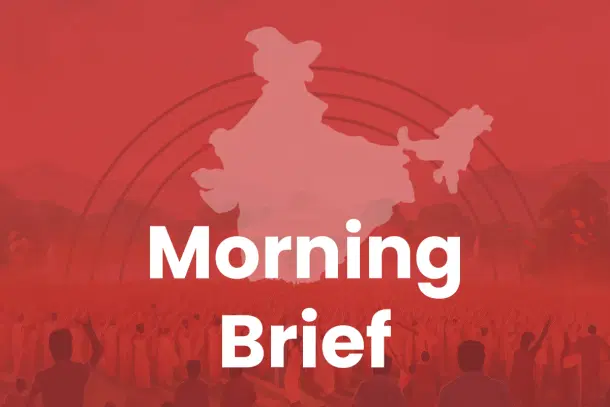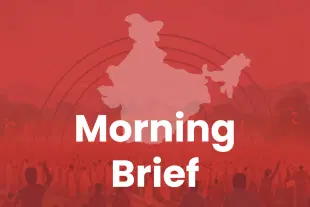News Brief
Morning Brief: India’s Myanmar Strike Foils China-Pakistan Bid To Revive N-E Insurgency; Jaishankar Heads To Beijing For First Visit Since 2020 Galwan Clash; And More
Swarajya Staff
Jul 14, 2025, 08:42 AM | Updated 08:44 AM IST
Save & read from anywhere!
Bookmark stories for easy access on any device or the Swarajya app.


Kick-start your morning with Swarajya’s Morning Brief – your news fix, curated for clarity and insight.
India's Myanmar Strike Derails China-Pak Bid To Revive NE Insurgency
India’s drone strikes on ULFA(I) camps in Myanmar have delivered a setback to a China-Pakistan-backed effort to revive insurgency in the northeast,The Economic Times has reported. The precision strikes, reportedly conducted early Sunday (13 July), used loitering munitions to target senior ULFA(I) leaders. The outfit claimed three top cadres, including deputy chief Nayan Asom, were killed and 19 others injured. However, the Indian Army has officially denied carrying out the operation.
The strike follows intelligence that China facilitated Ulfa(I) chief Paresh Baruah’s movement from Ruili to Yunnan in March. Baruah is believed to support Beijing’s proposed 60,000 MW dam on the Yarlung Tsangpo and is reportedly lobbying for deeper Chinese support to revive militant networks across Bangladesh and Myanmar targeting India’s northeast.
Jaishankar Heads To China For First Time Since Galwan Clash
External Affairs Minister S Jaishankar is set to visit China this week for the Shanghai Cooperation Organisation (SCO) foreign ministers’ meeting, his first trip to the country since the 2020 Galwan clash. He will hold talks with Chinese Foreign Minister Wang Yi on a range of contentious issues, including the Ladakh border standoff, rare earth magnet exports, the Dalai Lama’s succession, and the recent India-Pakistan tensions.
The visit is seen as preparation for Prime Minister Narendra Modi’s likely participation in the SCO summit in September, where a meeting with President Xi Jinping is expected. The issues of resuming direct flights and raising concerns over China’s blocking of machinery and material exports to India are also likely to come up.
Meanwhile, the Chinese embassy in New Delhi has said that Tibet remains a “thorn” in India-China relations, warning that playing the “Xizang card” would be self-defeating for India. The statement follows recent remarks by Union minister Kiren Rijiju, who said the Dalai Lama’s reincarnation could be decided only by Tibetan leaders.
Other Developments
EC Asks All States to Prep For Intensive Voter Roll Revision
A week after launching its special electoral roll revision in Bihar, the Election Commission has directed all states to begin similar preparations using January 1, 2026, as the qualifying date. The exercise, aimed at cleansing the rolls, will include house-to-house verification and document checks. While the final timeline is undecided, states are to complete preparatory work such as BLO appointments and polling station updates.
The move follows controversy in Bihar over proof of citizenship requirements, with the Supreme Court urging EC to consider Aadhaar, voter ID, and ration cards. The revision is likely to become politically sensitive in states like West Bengal, Tamil Nadu, and Assam, all headed for polls in 2025.
Trump's Copper Tariff May Hurt India’s Chip Plans
President Donald Trump’s new 50 per cent tariff on copper imports has sparked global supply chain concerns, with Indian semiconductor and electronics leaders warning of ripple effects on India’s chip-making ambitions. Industry experts say the move, though not targeted at India, could raise input costs and disrupt access to semiconductor-grade copper critical for wiring, circuit boards, and packaging.
India imports a significant share of refined copper and concentrates, but domestic producers like Hindustan Copper and Hindalco do not supply chip-grade materials at scale. Experts from SEMI India and IESA have called for urgent policy steps to build upstream resilience, including easing import procedures, boosting domestic copper refining, and considering strategic reserves, to avoid cost escalation and delays in India’s semiconductor projects.
Small Cities Lead IT Hiring Surge
Tier-II and Tier-III cities in India recorded a sharp 50 per cent rise in IT hiring during the first half of 2025, significantly outpacing metros like Bengaluru and NCR, which saw 12 to 15 per cent growth. Cities such as Indore, Coimbatore, Jaipur, and Nagpur have emerged as new talent hubs, supported by improved digital infrastructure, local college recruitment, and hybrid work flexibility, according to staffing firms including Teamlease and CIEL HR.
Mysuru has become a frontrunner in emerging technologies like generative AI, accounting for 32 per cent of hiring in that segment among Tier-II cities. Demand is also rising for cloud engineers, cybersecurity analysts, and full-stack developers, with global capability centres driving much of the momentum.
From The States
Foreign Nationals Found in Bihar Voter Rolls
A significant number of suspected foreign nationals from Nepal, Bangladesh, and Myanmar have been found listed in Bihar’s electoral rolls during an ongoing special revision, Election Commission officials said on Sunday. These individuals reportedly possess Aadhaar cards, ration cards, and domicile certificates, documents not accepted as valid voter ID proof under current EC norms.
The Commission will conduct a detailed enquiry from August 1 to 30 and remove such names from the final rolls, to be published on September 30, if found ineligible. The issue is expected to bring renewed scrutiny to the Seemanchal region, which has long been under the radar for illegal infiltration. The Home Ministry has flagged concerns over infiltration, particularly of Rohingyas, in parts of Bihar and elsewhere.
Massacre Day Curbs Spark Outrage in Kashmir
Chief minister Omar Abdullah and several senior political leaders in J&K, including Mehbooba Mufti and Farooq Abdullah, were confined to their homes on Sunday, as authorities clamped down on commemorations of the 13 July 1931 killings. Security forces sealed roads, shut party offices, and blocked access to the Martyrs’ Graveyard in Srinagar, the resting place of 22 Kashmiris killed during a protest against Dogra rule.
Calling the restrictions “blatantly undemocratic,” Omar likened the 1931 episode to Jallianwala Bagh, asserting the martyrs opposed British rule under Paramountcy. Mehbooba Mufti echoed the sentiment, urging recognition of Kashmir’s historical heroes. While the NC leads the elected government, security remains under the Centre’s control through the lieutenant governor, a legacy of the post-2019 changes to J&K’s status.
New Law To Tackle Urban Maoist Threat: Fadnavis
Maharashtra chief minister Devendra Fadnavis on Sunday said the new Maharashtra Special Public Security Bill, 2024, will be used to address the growing challenge of urban Maoism. He described it as a strategic shift by Maoists, who, after losing ground in forests, are targeting cities by infiltrating universities, organisations, and democratic institutions.
Fadnavis said the law was passed after extensive debate, committee scrutiny, and over 12,000 public suggestions. He clarified that the law allows action only after judicial review of a banned organisation, and does not curtail lawful dissent. Those opposing the Bill, he claimed, are indirectly supporting the ideology of Left-wing extremism.
You’re all caught up—until next time.





